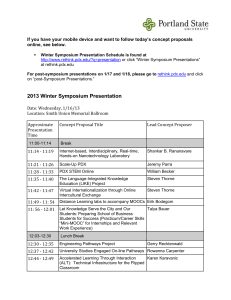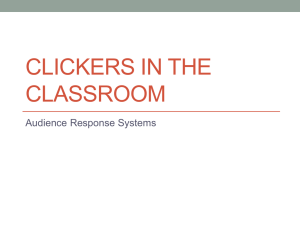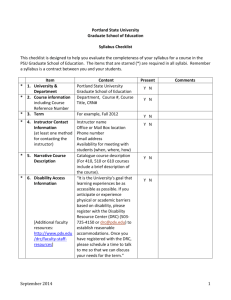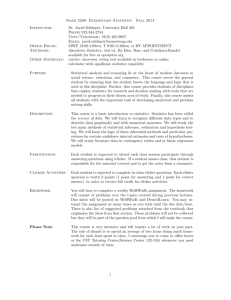Syllabus for Bi 252: Principles of Biology
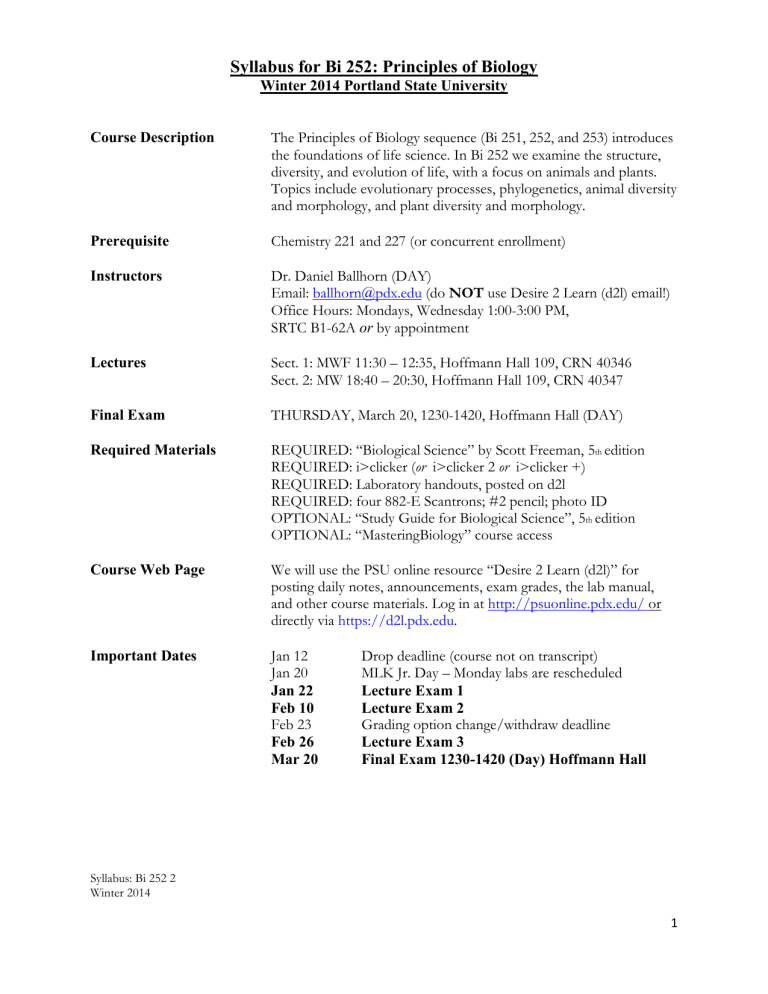
Course Description
Prerequisite
Syllabus for Bi 252: Principles of Biology
Winter 2014 Portland State University
The Principles of Biology sequence (Bi 251, 252, and 253) introduces the foundations of life science. In Bi 252 we examine the structure, diversity, and evolution of life, with a focus on animals and plants.
Topics include evolutionary processes, phylogenetics, animal diversity and morphology, and plant diversity and morphology.
Chemistry 221 and 227 (or concurrent enrollment)
Instructors
Lectures
Final Exam
Required Materials
Course Web Page
Dr. Daniel Ballhorn (DAY)
Email: ballhorn@pdx.edu
(do NOT use Desire 2 Learn (d2l) email!)
Office Hours: Mondays, Wednesday 1:00-3:00 PM,
SRTC B1-62A or by appointment
Sect. 1: MWF 11:30 – 12:35, Hoffmann Hall 109, CRN 40346
Sect. 2: MW 18:40 – 20:30, Hoffmann Hall 109, CRN 40347
THURSDAY, March 20, 1230-1420, Hoffmann Hall (DAY)
REQUIRED: “Biological Science” by Scott Freeman, 5 th edition
REQUIRED: i>clicker ( or i>clicker 2 or i>clicker +)
REQUIRED: Laboratory handouts, posted on d2l
REQUIRED: four 882-E Scantrons; #2 pencil; photo ID
OPTIONAL: “Study Guide for Biological Science”, 5 th edition
OPTIONAL: “MasteringBiology” course access
We will use the PSU online resource “Desire 2 Learn (d2l)” for posting daily notes, announcements, exam grades, the lab manual, and other course materials. Log in at http://psuonline.pdx.edu/ or directly via https://d2l.pdx.edu
.
Important Dates
Syllabus: Bi 252 2
Winter 2014
Jan 12
Jan 20
Jan 22
Feb 10
Feb 23
Feb 26
Mar 20
Drop deadline (course not on transcript)
MLK Jr. Day – Monday labs are rescheduled
Lecture Exam 1
Lecture Exam 2
Grading option change/withdraw deadline
Lecture Exam 3
Final Exam 1230-1420 (Day) Hoffmann Hall
1
Web registration of your i>clickers
Grading
Exams
Classroom Response
Grading Policy
Syllabus: Bi 252 2
Winter 2014
In order to reduce loss of time during lectures in week 1 online registration of your i>clickers is expected. To register online, go to iclicker.com and click the ‘Register Your i>clicker’ button.
To complete the student registration form:
1. Click ‘yes’ to the LSM question
2. Enter your ‘First Name’ and ‘Last Name’ in the appropriate fields.
3. Enter your ‘Student ID’ (your ODIN username/login NOT the 9 digit number).
4. Enter your i>clicker ‘Remote ID’. The remote ID is the 8character alphanumeric code printed below the barcode on the back of their remote.
5. Enter the ‘Image Code’. You can request another image if you find the first hard to read, or play an audio reading of it instead.
6. Click the ‘Register’ button. An on-screen message confirms that registration was successful. Your ODIN ID is now tied to your unique i>clicker remote ID for the term.
Lecture (total 75%):
Classroom response (“i>clicker”) questions: 10%
Class exams (best 2 of 3): 20% each (40% total)
Comprehensive final exam: 25%
Laboratory (total 25%):
See the Bi 252 laboratory syllabus for grading details.
There will be three class exams. Your lowest class exam score will be dropped. No make up exams will be given. The final exam will cover the whole course, and cannot be dropped.
Each lecture session will include questions to be answered using the required “i>clickers”. The first week’s questions will not be graded, but weeks 2-10 will. Your lowest 3 session scores will be dropped.
Missed clicker questions cannot be made up. You must be present to answer clicker questions. Any instance of cheating with clickers will result in a zero for the final clicker grade for all students involved. 1 pt. for correct answer, 0.5 pt. for participation
Grades will be assigned according to the percentage of possible points earned. As a rough guide, the top score on any given exam can be thought of as 100%. If you earn at least 90% of the highest score you will receive an A- or higher; if you earn at least 80% you will receive a B- or higher; if you earn at least 70% of the possible points you will receive a C- or higher; if you earn at least 60% of the possible points you will receive a D- or higher.
2
Classroom Policies
Academic Honesty
Academic Courtesy
Schedule
Facilities
Disability
Weather
Labs in SB1
Cheating or plagiarism of any kind will not be tolerated. See the PSU
“Code of Student Conduct and Responsibility” for more information: http://www.pdx.edu/dos/conductcode . If cheating occurs, the grade for the assignment will be a “0” (and will not be dropped), and the student will be reported to University officials as described in the Code (577-031-014: Procedures for
Complaints of Academic Dishonesty).
Respect the rights of fellow students during the class period. Please avoid talking and other distracting behavior, and turn phones off.
Students are expected to arrive for class on time so that lectures and labs start and end according to schedule.
Everyone is expected to help maintain the appearance of the classroom. After class, all trash should be removed and discarded appropriately.
If you have a disability and are in need of academic accommodation: first register with the Disability Resource Center (503)725-4150, http://www.pdx.edu/uasc/drc.html
, then notify Dr. Ballhorn to make appropriate arrangements. Students with testing accommodation must take exams on the same day as scheduled lecture exams.
As our class takes place during the winter, severe weather might cause university closures or delays in opening etc.
Officials will announce any delays or closures early in the morning via PSU Alert and a bulletin on the PSU homepage at http://www.pdx.edu
. For more information on PSU's inclement weather policies and procedures, go to http://www.pdx.edu/hr/news-announcements . Contact your TA, head TA and professor if you cannot make it to the labs due to weather.
You are required to attend each lab, and to arrive for all of your labs on time. Missed labs cannot be made up.
A badge access ID is required to enter Science Building 1 for labs that take place at 6am and on Saturdays. This is different than your student ID. Please make sure you have obtained a badge access ID from Neuberger by the second week of classes, if you do not already have one.
3
Syllabus: Bi 252 4
Winter 2014
Week
1
2
3
Dates
Jan 06 – Jan 10
Jan 13 - Jan 17
Jan 20 - Jan 24
Scheduled Topics
1
Lecture:
Text:
Lab:
Lecture:
Text:
Lab:
Lecture:
Text:
Lab:
Animal & Plant Development
Chapters 22, 23 & 24
1: Developmental Biology
Natural Selection; Evolutionary Processes
Chapters 25 & 26
2: Natural Selection
Speciation
Chapter 27
3: Cnidarians, Platyhelminthes, Nematodes, and Annelids
4
5
6
EXAM
Jan 27 - Jan 31
Feb 03 - Feb 07
Feb 10 - Feb 14
Feb 17 - Feb 21
Feb 24 - Feb 28
Lecture:
Text:
Lab:
Lecture:
Text:
Lab:
Lecture:
Text:
Lab:
No lectures or labs on Monday, Jan 20 (MLKJr. Day)
HOUR EXAM 1 on Wednesday, January 22
Phylogenies & the History of Life; Protists
Chapters 28 & 30
4: Mollusks
Taxonomy and Introduction to Animals; Protostomes
Chapter 33 & 34
5: Arthropods
Deuterostomes
Chapter 35
6: Phylogeny and Comparative Anatomy of Deuterostomes
7
8
EXAM
Lecture:
Text:
Lab:
Lecture:
Text:
Lab:
HOUR EXAM 2 on Monday, February 10
What is a plant?; Photosynthesis; Plant Form and Function
Chapters 10 (review) & 37
7: Photosynthesis and Plant Pigments
Plant Reproduction; Phylogeny (Green Algae & Land Plants
Chapters 41 & 31
8: Vegetative Structures and Function
9
10
EXAM
Mar 03 - Mar 07
Lecture:
Text:
Lab:
Mar 10 - Mar 14
Lecture:
Text:
Lab:
Finals Mar 19 - Mar 21
HOUR EXAM 3 on Wednesday, February 26
Water & Sugar Transport; Plant Nutrition; Plant Sensory
Systems
Chapters 38, 39 & 40
9: Stomatal Density
Fungi
Chapters 32
10: Reproduction; SPECIES ACCOUNTS DUE
EXAM 4 (FINAL EXAM)
THURSDAY, March 20 1230 – 1420 (DAY section)
*
Lecture topics may change from those listed in the syllabus.
Exams will be given as scheduled.
4
Syllabus: Bi 252 5
Winter 2014
Tips for Success
If you are unfamiliar with college coursework, we recommend you attend the Skills Enhancement and Tutoring Center’s workshops ( http://www.setc.pdx.edu/ ), with topics including Time
Management, Note Taking and Reading Skills, Test Taking Strategies, etc.
Be an active learner. Attend all lectures. You are responsible for all topics discussed in the lecture, even if they do not appear in the online notes. Take notes during class – do not rely on the printed-out class notes alone. Write down questions that come to mind during the lecture.
Identify points in the lecture that you think are the main points. Review your notes after class, incorporating details that you remember but didn't get written down. While you are reading the textbook, take time to think about what you are reading. How does it fit with what you know already? Combine the information from the lecture and the text into one set of complete notes to review and study. Try the Cornell System of note-taking and review: a simple but powerful method for studying. See: http://lsc.sas.cornell.edu/LSC_Resources/cornellsystem.pdf
Figure out and use your learning strengths. Learning styles vary from person to person. You might do your best studying through reading, writing, or drawing, or through discussion with fellow students. Most likely, it will take some of each to be most successful. Experiment, and use the techniques that work best for you.
Spend time on this course.
Schedule and spend time reading and reviewing course materials.
Revisit your notes, and think about the logical structure underlying the subjects. Plan on spending a significant amount of time (10-12 hours/week) working on this course. Later topics build upon earlier portions of the course: please do not let yourself fall behind.
Ask for help if you need it. Come to our office hours, talk to your TA, find a study partner or study group, use the Discussions board on Blackboard, etc. You’ll make the best progress when you are active about seeking answers.
Use the University resources.
Campus services are available to help you with all aspects of your education, see http://www.pdx.edu/studentaffairs . PSU's undergraduate advising website is http://www.pdx.edu/advising . The Undergraduate Advising and Support Center (UASC), 425
Smith, http://www.pdx.edu/uasc/ , offers academic advising and referral, academic support programs, community college relations, disability resource center, athletics advising, study skills workshops, tutorial programs, and veteran services.
5
